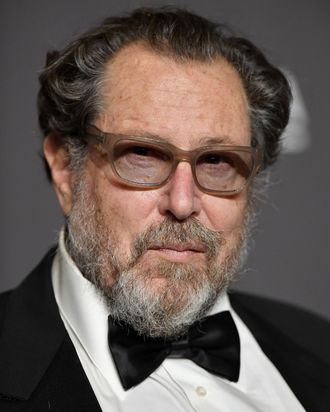
At Eternity’s Gate, Julian Schnabel’s don’t-call-it-a-biopic on Vincent van Gogh, is a course correction, a different look at the artist that overturns some long-held, but inaccurate, assumptions perpetuated through history (and by lots of other more on-the-nose van Gogh movies, including the 1956 Kirk Douglas stinker, Lust for Life). On the phone with Jerry Saltz, Schnabel addressed a few common myths.
True or False?
He was crazy.
False: “I don’t think he was crazy at all, and these myths that have been propagated are a disservice — [people] think artists have to be nuts to be good. If you really look at [van Gogh’s] paintings, they’re not the works of a madman.”
He died a failure.
False: “I didn’t think he was failed artist. He was doing exactly what he wanted to do, and success is not measured by sales or money. The reward is making the work, not other people agreeing with you. That being said, [the art critic Albert] Aurier saw van Gogh’s paintings of the sunflowers and wrote about them, and that was read by everyone in [van Gogh’s] circle. So I felt it was important for people to know that he was not unknown.”
Paul Gauguin was his enemy.
False: “[French post-Impressionist] Gauguin was always portrayed as the villain in regards to van Gogh, but I think they had mutual respect for each other. Brice Marden and I have been friends for 40 years. We’ve had some funny run-ins, but ultimately there’s a lot of love and respect there. [In the film], that letter from Gauguin to van Gogh when he’s in the hospital — it’s the best review he could have gotten. It meant loads to van Gogh that Gauguin wanted to exchange a painting with him.”
He was anti-social.
True: “I think he had a difficult time with people. He was very focused on one thing. Van Gogh had a very intense lens on the world, and I don’t think that that necessarily permitted a lot of other skills. And he probably did have moments where he blacked out, where he couldn’t remember things. Like [he says in the movie] when he’s talking with Gauguin, ‘Sometimes it’s so intense when I’m in the middle of nature that I forget my name and it’s hard to remember where I am.’ If you really get out there in your work, it’s very hard to sit down at the table with somebody and act like a normal person again.”
*This article appears in the November 12, 2018, issue of New York Magazine. Subscribe Now!




